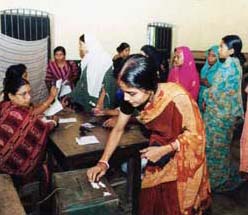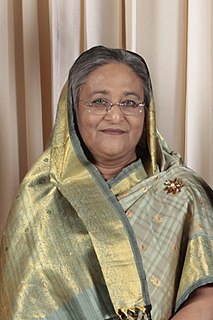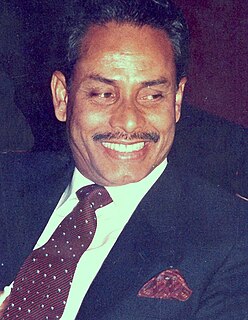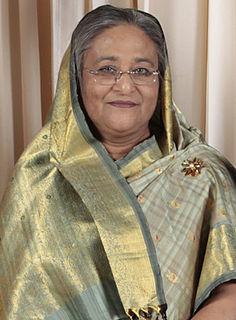
Politics of Bangladesh takes place in a framework of a parliamentary representative democratic republic, whereby the Prime Minister of Bangladesh is the head of government, and of a multi-party system. Executive power is exercised by the government. Legislative power is vested in both the government and parliament. The Constitution of Bangladesh was written in 1972 and has undergone sixteen amendments. The Economist Intelligence Unit has rated Bangladesh as "hybrid regime" in 2016.

Khaleda Zia is a Bangladeshi politician who served as the Prime Minister of Bangladesh from 1991 to 1996, and again from 2001 to 2006. She was the first woman in the country's history and second in the Muslim majority countries to head a democratic government as prime minister. She was the First Lady of Bangladesh during the presidency of her husband Ziaur Rahman. She is the current chairperson and leader of the Bangladesh Nationalist Party (BNP) which was founded by Rahman in the late 1970s.

The Prime Minister of the People's Republic of Bangladesh is the Head of the Government of Bangladesh. The Prime Minister and the Cabinet are collectively accountable for their policies and actions to the Parliament, to their political party and ultimately to the electorate.

The Jatiya Sangsad, often referred to simply as the Sangsad or JS and also known as the House of the Nation, is the supreme legislative body of Bangladesh. The current parliament of Bangladesh contains 350 seats, including 50 seats reserved for women, which are apportioned on elected party position in the parliament. Elected occupants are called members of parliament or MP. The 11th National Parliamentary Election was held on 30 December 2018. Elections are held every five years unless the parliament is dissolved before that time.

Sheikh Hasina Wazed is a Bangladeshi politician serving as the 10th Prime Minister of Bangladesh, having held the office since January 2009. She is the longest serving prime minister in the history of Bangladesh.

Hussain Muhammad Ershad is a former Bangladeshi Army Chief and politician who served as the President of Bangladesh from 1983 to 1990, a time many consider to have been a military dictatorship.
Islami Jatiya Oikya Front was a short-lived political alliance in Bangladesh. Formed in 2001, it was one of the three principal contenders in that year's parliamentary elections. Led by the Jatiya Party (Ershad), it also included the Islami Shashontantra Andolan (ISA) and three smaller parties.

Elections in Bangladesh gives information on election and election results in Bangladesh.

The Jatiya Party is a conservative political party in Bangladesh. The current chairman of the party is Hussain Mohammad Ershad. On January 3, 2019, the party announced its decision to join the Awami League-led Grand Alliance after having been in opposition for the previous parliamentary term. However, the party backtracked the next day and announced that it intended to remain part of the opposition. Currently, it holds Rangpur out of Bangladesh's 12 city corporations.
The Eighth National Parliamentary Elections 2001 were held in Bangladesh on 1 October 2001. 300 single-seat constituencies for the Jatiya Sangsad were contested by 1,935 candidates representing 54 parties and including 484 independents. The election was the second to be held under the caretaker government concept, introduced in 1996. The chief adviser of the caretaker government was Justice Latifur Rahman. The result was a win for the Bangladesh Nationalist Party with its leader Khaleda Zia becoming Prime Minister.

The Seventh National Parliamentary Elections 1996 were held in Bangladesh on 12 June 1996. The result was a victory for the Bangladesh Awami League, which won 146 of the 300 seats, beginning Sheikh Hasina's first-term as Prime Minister. Voter turnout was 75.6%, the highest to date. This election was the second to be held in 1996, following controversial elections held in February a few months earlier.

General elections were held in Bangladesh on 3 March 1988. They were boycotted by several major parties, including the Bangladesh Awami League, the Bangladesh Nationalist Party, the Communist Party of Bangladesh, Jamaat-e-Islami Bangladesh, the Bangladesh Krishak Sramik Awami League, the National Awami Party (Muzaffar) and the Workers Party of Bangladesh. The result was a victory for the Jatiya Party, which won 251 of the 300 seats. Voter turnout was 52.5%.
The Sixth National Parliamentary Elections 1996 was held in Bangladesh on 15 February 1996. They were boycotted by most opposition parties, and saw voter turnout drop to just 21%. The result was a victory for the Bangladesh Nationalist Party (BNP), which won 300 of the 300 elected seats. This administration was short lived however, only lasting 12 days before the installation of caretaker government and fresh elections held in June.
The history of Bangladesh after independence begins in 1971 with the independence of Bangladesh from Pakistan.

General elections were held in Bangladesh on 5 January 2014, in accordance with the constitutional requirement that the election must take place within the 90-day period before the expiration of the term of the Jatiya Sangshad on 24 January 2014. The elections were controversial, with almost all major opposition parties boycotting and 153 of the total 300 seats being uncontested. Around 21 people were killed on election day.

General elections were held in Bangladesh on 30 December 2018 to elect members of the Jatiya Sangsad. The result was a landslide victory for the Awami League led by Sheikh Hasina. The elections were marred by violence and claims of vote rigging. Opposition leader Kamal Hossain rejected the results, calling it "farcical" and demanding fresh elections to be held under a neutral government. The Bangladesh Election Commission said it would investigate reported vote-rigging allegations from "across the country." The election saw the use of electronic voting machines for the first time.

The 1980s was a decade of the Gregorian calendar that began on January 1, 1980, and ended on December 31, 1989. For Bangladesh this decade was characterized by economic hardship, natural disasters and military dictatorship. Hussain Muhammad Ershad ruled Bangladesh almost throughout the decade. Infrastructure development was slow but there was notable progress in local government administration, population control and NGO led microfinance activities which boosted the rural economy. The urge of freedom of speech and return to democracy influenced the cultural activities in the decade.

The 1990s was a decade of the Gregorian calendar that began on January 1, 1990, and ended on December 31, 1999. For Bangladesh this decade was characterized by transition to democracy, rapid urbanisation and globalization and struggle for free and fair elections. The newly earned democracy influenced the cultural activities in the decade.
The National Unity Process is a political initiative in Bangladesh launched by Dr. Kamal Hossain, a long-standing proponent of a period of national unity government for political reform in the country. The initiative has received support from major opposition parties. The aim of the initiative has been to pressure the Awami League government of Prime Minister Sheikh Hasina to hold a free and fair election in December 2018 with the participation of all major political parties. The previous general election in Bangladesh, held in 2014, was boycotted by major opposition parties and was not deemed credible by the United States, the United Kingdom, the European Union and the United Nations.
























